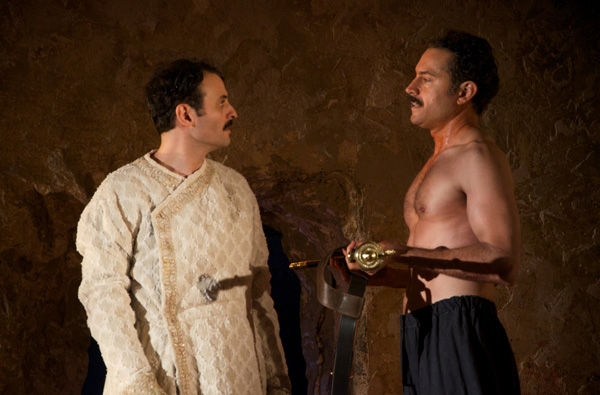
(© Doug Hamilton)
Playwright Rajiv Joseph (Bengal Tiger at the Baghdad Zoo, The North Pool) has a talent for folding contemporary issues into compelling works of drama. His latest play, Guards at the Taj (now making its world premiere at Atlantic Theater Company), continues in that vein, though its setting is decidedly not modern. Taking place in 1648 Agra, roughly around the completion of the Taj Mahal, Guards at the Taj is just as shrewd as Joseph's earlier plays, but far more formally ambitious. It's a risk that pays off.
The play is based on a popular myth associated with the Taj Mahal: When it was completed, Mughal Emperor Shah Jahan (who commissioned the project as a mausoleum for his empress) ordered the hands of all craftsman and slaves involved in its construction to be cut off so that nothing so beautiful could ever be built again. There is no historical evidence supporting this folklore, but then again, writers of the Mughal period were not very interested in documenting the lives of lowly laborers. This gives Joseph space to exercise his artistic license, which he does with great panache through two imperial guardsmen charged with amputating 40,000 hands.
Sporting thick mustaches, white embroidered robes, and long scimitars (gorgeous costumes by Bobby Frederick Tilley II), the two guards look roughly the same. After a minute of listening to them speak, however, one comes to understand them as very different people. Humayun (Omar Metwally) is a conformist, anxious to execute his duties by the book. Babur (Arian Moayed) is a dreamer, always thinking up wild inventions, like a flying palanquin he calls an "Aeroplat." He would be the Indian Leonardo da Vinci if he didn't have to stand around all day silently guarding the city.
Obsessed with beauty, Babur disobeys orders and turns around to gaze at the newly completed Taj Mahal. Ever so tepidly, Humayun joins him. When they realize what the Emperor has ordered (and who must carry those orders out) to jealously protect this fresh wonder of the world, they panic. When the punishment for disobedience is death, however, what choice do they have?
Revealing an interior room through the clever use of what appears to be an automatic garage door, set designer Timothy R. Mackabee has fashioned the chamber of horrors in which the amputations take place with chains on the stone walls and baskets of severed hands dotting the room. A pool of blood covers the floor. It's visually revolting. The awfulness of their surroundings contrasts hilariously and tragically with the triviality of their chatter. As they sop up the blood from their butchery they talk about hypothetical inventions, like Humayun's transportable hole: a hole that could be placed anywhere and allow the user to transport out of that space, like in a Bugs Bunny cartoon. Certainly, they could both use one of those in this moment.
The two-dudes-chatting-about-nothing-as-major-events-unfold-around-them concept has been done before, most notably in Tom Stoppard's Rosencrantz and Guildenstern Are Dead. Joseph takes this conceit and applies it to the Taj myth, resulting in a theatrical experience that is both intellectually and spiritually nourishing. There's so much to think about in this play: the line between personal and collective duty, jealousy in the Islamic tradition, and the role of the patriarchy in upholding the status quo (the intimidating specter of Humayun's severe father looms over the play). At the same time, we get to know these two mass-behanders as real (and very charming) people.
While this Stoppardian form (attacking serious subjects with light and witty language) could easily become very dull, it never does thanks to committed performances by Metwally and Moayed. Moayed synthesizes a childlike innocence with perfect comic timing. More the straight man, Metwally exudes a machismo that is regularly sabotaged by his scene partner. Amy Morton has directed them like a vaudeville comedy duo, and this turns out to be the perfect (although not obvious) choice.
One wouldn't normally associate laughter with such a terrible act of cruelty, but it's really the only way to get audiences to take this journey without descending into unrestrained pathos. Simultaneously witty, tragic, enlightening, and prescient, Guards at the Taj is definitely a trip worth taking.









